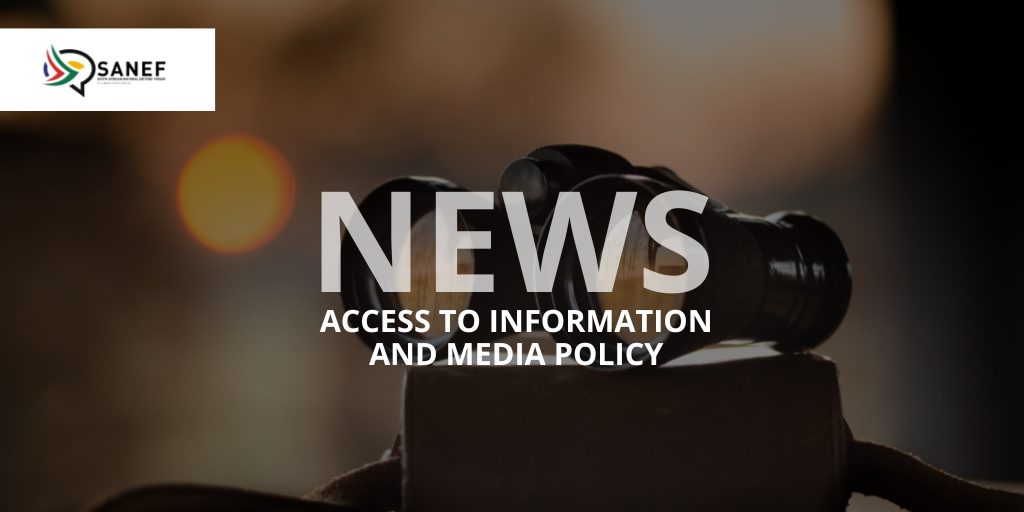Joint Media Release With MMA & SANEF: South Africa’s Promotion of Access to Information Act After 20 Years
The importance of the right of access to information cannot be disputed. The right gives meaning to the constitutional values of accountability, responsiveness and openness, and enables the public to seek transparency from both public and private sector actors. It is both an important right in itself, as well as an enabler of the full range of fundamental rights.
However, on this International Day for Universal Access to Information, as we reflect on the Promotion of Access to Information Act 2 of 2000 (PAIA) after 20 years of enactment in South Africa, it is apparent that there is an urgent need to reform PAIA to make it useful and effective in the digital era.
As such, Media Monitoring Africa, the South African National Editor’s Forum (SANEF) and other like-minded organisations, supported by access to information activists and legal experts, have embarked on a process to draft proposed amendments to PAIA in an effort to ensure that PAIA meaningfully realises the right of access to information in a timely and effective manner. The proposed amendments draw on the work by the South African Human Rights Commission, our courts and civil society actors in identifying the shortcomings and pitfalls that currently exist in the provisions and implementation of PAIA.
Importantly, the proposed amendments also seek to bring PAIA in line with regional human rights standards on access to information, including the work of the African Commission on Human and Peoples’ Rights (ACHPR) through the Declaration of Principles on Freedom of Expression and Access to Information in Africa, the Guidelines on Access to Information and Elections in Africa and the Model Law on Access to Information for Africa.
In the digital era, it is imperative that the right of access to information be fostered, both on- and offline, in order to safeguard a culture of transparency and accountability in South Africa. It is therefore crucial that all persons in South Africa have meaningful access to the internet and online information, and that disclosures of information are made available through different platforms that render such information readily accessible to the public.
In sum, the proposed amendments have been informed by the following five key principles:
- Primacy: Access to information, as a constitutional imperative, should be treated with appropriate primacy over other laws that otherwise restrict or inhibit the public’s right to be informed. The proposed amendments seek to ensure that the scope and ambit of PAIA are appropriately clarified to assist requesters in obtaining the information to which they are entitled without unnecessary hurdles.
- Maximum disclosure: The right of access to information should be guided by the principle of maximum disclosure, with the right only being limited by narrowly defined exemptions that meet the test for a reasonable and justifiable limitation in an open and democratic society.
- Proactive disclosure: Information in the public interest should be proactively disclosed, even in the absence of a specific request, in recognition of the role that such information plays in the full realisation of fundamental rights.
- International commitments: South Africa must abide by its international commitments on access to information, including in respect of open government and open data standards through the Open Government Partnership. These commitments evince a move towards more openness on a proactive basis and are deserving of being effectively fulfilled.
- Online protections: In the current digital era, the exercise of the right of access to information must be respected, protected and promoted, both on- and offline. This places a duty on public and private sector actors to ensure that, in fulfilling their obligations, due regard is had to the medium and format in which information is made available.
Underlying these principles is a core concern about the efficacy of PAIA in meaningfully realising the right of access to information. In the two decades since its enactment, a number of pertinent issues have come to the fore, such as delayed, stifled or incomplete disclosures of information. This cannot be allowed to persist.
It is well-accepted that access to information plays a particularly important role in democratic processes and empowering the electorate to make informed choices. This includes in respect of electing office-bearers, in participating in decision-making and law-making processes, and in holding public and private sector actors accountable for their acts or omissions in the execution of their duties. Moreover, the right of access to information fosters a vibrant media culture that plays a central role in receiving and imparting information and ideas. This is more important than ever and deserving of protection and support from all segments of society.
As we look to the future of access to information in South Africa, we continue to strive for a society that is underpinned by our constitutional values and democratic governance. While PAIA is one of the instruments through which this can be done, there remains much work ahead before the right of access to information can be meaningfully realised in South Africa.
This public announcement today on our efforts to reform and improve PAIA follows on months of work by a team of lawyers to incorporate the principles referred to above, and address problems encountered by members of the Access To Information Network, journalists and others in civil society to use PAIA.
The next step is to approach a wider group of PAIA users and experts to make sure that their concerns are captured in the draft amendments. The final step will be to hand the draft over to the Human Rights Commission, the Information Regulator and the Department of Justice for consideration and processing by the executive and parliament.
Socials
Twitter: @SAEditorsForum
Email: [email protected]
Website: SANEF



